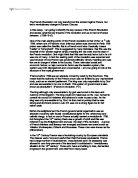How important were the financial problems of the French Crown in bringing about the French Revolution in 1789?
21st October 2015
How important were financial problems of the Crown in bringing about the French Revolution in 1789? [20]
The financial problems of the Crown were hugely important in bringing about the French Revolution. However the constitution of France itself at the time was also a major factor of its downfall. The financial problems included the weakness of the tax system, the poor harvests during the 1780s and the war debt accumulated from the wars France fought during the 18th Century. The constitutional problems (the feudal system, lack of will to reform from the nobility, etc.) could be considered the roots of France’s problems. However they often overlap in cause and effect with the financial issues.
France’s tax system in the 1700s was considered unfair by the growing bourgeoisie class and the poorest members of society: the peasantry and urban peasants. The tax system was centred on the comfort of the nobility, rather than the revenue of the Crown: the 1st and 2nd Estates were exempt from most fiscal duties. The irony of this system was that these Estates held most of France’s money, while the peasantry and bourgeoisie paid the most, despite their financial disadvantage. This was important as it caused the Crown’s tax revenue to fall far from its potential, which was needed to resolve the other financial matters at hand. Another reason for the Crown’s falling short of its potential was the actual process of collecting taxes. Private bodies (usually the infamous “Farmer’s General”) were hired by the Crown to collect the tax, with a pre-arranged minimum income. The remainder of the money was retained by the private body. The bourgeoisie and nobility were the usual owners of such private bodies, removing what could have been the Crown’s money permanently. Although this is more a problem of France’s constitution, it was recognised by many of the later Controller-Generals (such as Turgot and Calonne) as a major contributor to the financial issues. The peasantry lost around 10% of their income to tax along with extra expenditures such as feudal dues, rent and the effects of the “corvée” (losing workers would mean a loss in income from harvest for most peasant families). The huge burden of tax meant that few peasants could ever make much profit and therefore provide the Crown with more income. The tax system was probably the factor which caused the Crown the most financial problems due to its inefficiency. It was highly important in the development of economy, making its failure salient as a long term cause of the revolution.








